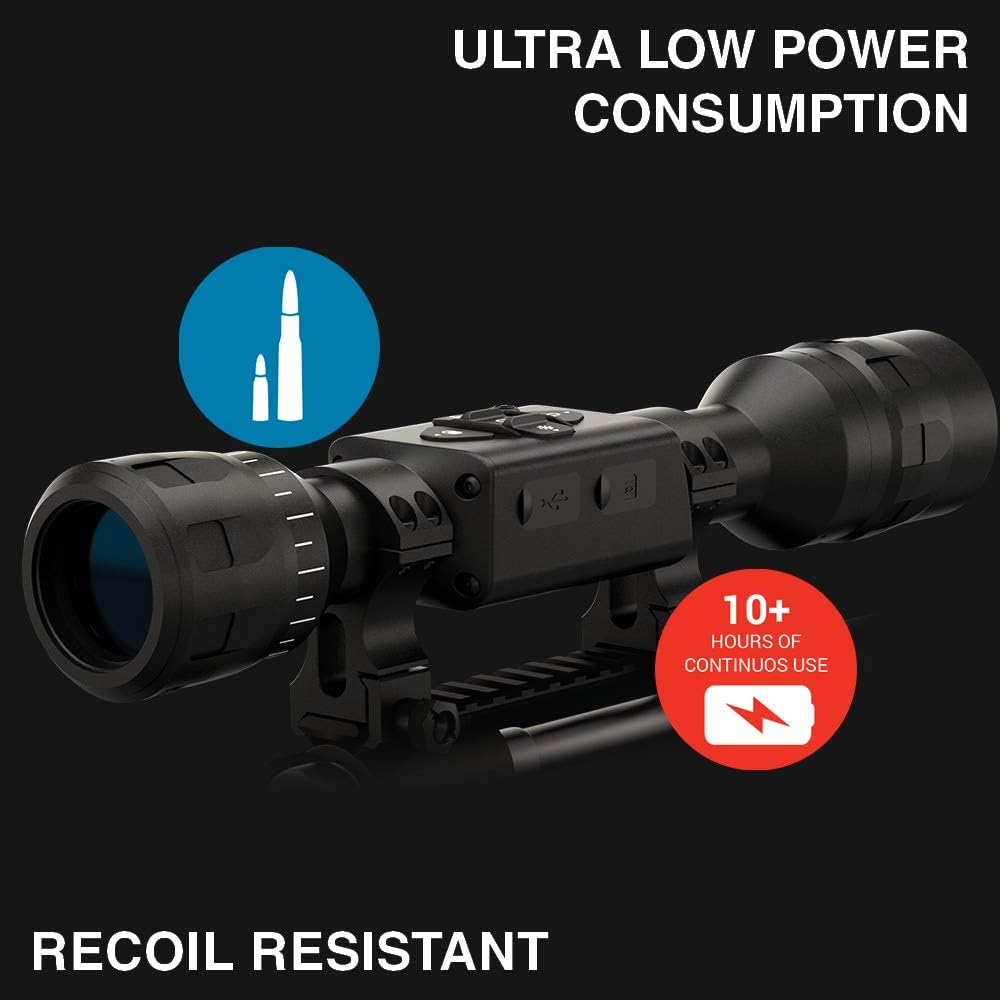

Have you ever wondered how long a night vision scope can last? Whether you are an avid hunter, a nature enthusiast, or someone who enjoys nighttime activities, knowing the lifespan of a night vision scope is crucial.
In this article, we will explore the average lifespan of a night vision scope and provide you with valuable insights to help you make the most out of this advanced optical device. So, let’s jump right in and discover how long you can expect your night vision scope to endure!
Factors Affecting Lifespan Of Night Vision Scopes
Night vision scopes are essential devices for individuals who require enhanced visibility in low-light or dark environments such as hunters, law enforcement officers, and outdoor enthusiasts. The lifespan of a night vision scope can vary depending on several factors.
By understanding these factors, you can make informed decisions about your night vision scope purchase and take steps to prolong its lifespan.
Quality Of Optics
One of the most critical factors affecting the lifespan of a night vision scope is the quality of its optics. The optics of a night vision scope refer to the lenses and other components responsible for capturing and projecting images. Higher-quality optics generally offer better image clarity and resolution, resulting in a more enjoyable and efficient night vision experience.
Optics made from durable materials and designed to withstand the challenging conditions often encountered during nighttime activities are likely to have a longer lifespan. Additionally, night vision scopes with multi-coated lenses can provide added protection against scratches and other forms of damage, thereby prolonging their lifespan.
Type Of Night Vision Technology


Night vision scopes utilize different types of technology to enhance visibility in low-light conditions. The most common types of night vision technology are Generation 1, Generation 2, Generation 3, and Generation 4. Each generation represents advancements in technology and performance, with Generation 4 being the most advanced and typically offering the best image quality.
The lifespan of a night vision scope can be influenced by the type of technology it employs. Generally, scopes with higher generations tend to have a longer lifespan due to the superior quality of their components and construction. However, it’s important to note that higher-generation night vision scopes are often more expensive.
Operating Conditions
The operating conditions under which a night vision scope is used can significantly impact its lifespan. Nighttime activities, such as hunting or surveillance, may involve exposure to harsh weather conditions, including rain, snow, and extreme temperatures. Prolonged exposure to such conditions can lead to wear and tear, reducing the overall lifespan of the scope.
To maximize the lifespan of your night vision scope, it is important to consider the intended usage and select a scope that is designed to withstand the specific operating conditions you will encounter. Look for night vision scopes that are water-resistant, weatherproof, and built with durable materials to ensure longevity, even in challenging environments.
Frequency Of Use
The frequency of use is another important factor that can affect the lifespan of a night vision scope. Night vision scopes that are used more frequently may experience faster wear and tear than those used infrequently. Continuous use can put stress on the internal components of the scope, leading to decreased performance and a shorter overall lifespan.
If you plan to use your night vision scope regularly, it is advisable to invest in a higher-quality scope that is designed to handle frequent use. Additionally, following proper maintenance practices, such as regular cleaning and inspections, can help identify and address any potential issues before they become major problems.
Maintenance Practices
Proper maintenance practices are crucial for preserving the lifespan of a night vision scope. Regular cleaning, especially of the lenses and other optical components, is essential to ensure optimal performance and prevent dirt, debris, and moisture from accumulating and causing damage.
Cleaning should be done using recommended techniques and products to avoid scratching or otherwise harming the optics.
Additionally, periodically inspecting the scope for signs of wear and tear, such as loose components or damaged seals, can help identify potential issues early on. If any issues are identified, it is recommended to have the scope serviced by a professional to prevent further damage.
Expected Lifespan Of Different Night Vision Scope Types
Night vision scopes are available in different generations, each offering varying levels of performance and capabilities. Understanding the expected lifespan of each scope type can assist you in making an informed decision when selecting a night vision scope.
Generation 1 Scopes
Generation 1 night vision scopes are the oldest and least expensive type of night vision technology available. They were developed during the 1960s and although they may lack some of the advanced features found in newer scopes, they still offer enhanced visibility in low-light conditions.
The expected lifespan of a Generation 1 night vision scope can vary depending on factors such as the quality of components and usage frequency. On average, a well-maintained Generation 1 scope can provide reliable performance for around 1,500 to 2,500 hours of usage.
Generation 2 Scopes
Generation 2 night vision scopes represent a significant improvement over Generation 1 scopes in terms of image quality and overall performance. They utilize more advanced technology and often have better light sensitivity, resulting in clearer and brighter images.
The expected lifespan of a Generation 2 night vision scope is generally longer than that of a Generation 1 scope. With proper care and maintenance, a Generation 2 scope can provide reliable performance for approximately 2,500 to 5,000 hours of usage.
Generation 3 Scopes
Generation 3 night vision scopes are further advancements in technology, offering superior image clarity, increased light sensitivity, and extended range capabilities compared to previous generations. They are commonly used by military and law enforcement personnel due to their exceptional performance in various low-light scenarios.
The expected lifespan of a Generation 3 night vision scope is typically longer than that of Generation 1 and Generation 2 scopes. With proper usage and maintenance, a Generation 3 scope can provide reliable performance for approximately 10,000 to 15,000 hours of usage.
Generation 4 Scopes
Generation 4 night vision scopes represent the most advanced and highest-performing technology currently available. They offer exceptional image quality, enhanced light sensitivity, and extended range capabilities, making them highly sought after by professionals who require the best possible vision in low-light environments.
The expected lifespan of a Generation 4 night vision scope is generally similar to that of a Generation 3 scope. With proper care and maintenance, a Generation 4 scope can provide reliable performance for approximately 10,000 to 15,000 hours of usage.
Factors Influencing Lifespan In Different Night Vision Scope Generations
While the expected lifespans of different night vision scope generations give a general idea of their durability, there are several factors that can influence the actual lifespan of a scope within each generation.
Quality Of Components
The quality of components used in the construction of a night vision scope can have a significant impact on its lifespan. Night vision scopes with high-quality components, such as robust circuitry, durable housing, and superior lenses, are more likely to withstand the rigors of regular use and harsh operating conditions.
Opting for scopes from reputable manufacturers known for their commitment to quality can increase the chances of owning a long-lasting night vision scope.
Manufacturer’s Build Quality
The build quality of a night vision scope plays a crucial role in its overall durability and lifespan. Scopes manufactured with attention to detail, precision engineering, and stringent quality control measures are more likely to offer reliable performance for an extended period.
It is advisable to research and choose night vision scopes from manufacturers with a reputation for producing well-built and dependable products.
Generation-Specific Wear And Tear
Each generation of night vision scopes has unique design and construction characteristics that can affect its lifespan. Older generations, such as Generation 1, may have components that are more prone to wear and tear, resulting in a shorter overall lifespan.
On the other hand, newer and more advanced generations, such as Generation 3 and Generation 4, often incorporate improved materials and technologies that enhance the overall durability and longevity of the scopes.
Common Signs Of Wear And Tear In Night Vision Scopes


Over time, night vision scopes may show signs of wear and tear, indicating the need for repair or replacement. Being aware of these common signs can help you identify potential issues and take appropriate action to address them.
Image Degradation
One of the most noticeable signs of wear and tear in a night vision scope is image degradation. This can manifest as reduced image clarity, decreased brightness, or distortion. If you notice a significant decline in the quality of the images produced by your night vision scope, it may be an indication that components within the scope have deteriorated and require attention.
Decreased Battery Life
Night vision scopes rely on batteries to power their operation. With time and extended use, you may notice a decrease in the battery life of your scope. If your night vision scope is consuming batteries at a faster rate than when it was new, it may be a sign that internal components are failing or that the battery contacts require cleaning.
Malfunctioning Components
Malfunctioning components can occur in any electronic device, including night vision scopes. Common signs of malfunction can include flickering or intermittent display, unresponsive buttons or controls, or complete failure to power on. If you experience any of these issues, it is essential to have your night vision scope inspected or repaired by a professional to prevent further damage.
Prolonging The Lifespan Of a Night Vision Scope
While the lifespan of a night vision scope can be influenced by various factors, there are several steps you can take to maximize its durability and longevity.
Proper Storage
Proper storage is essential for maintaining the lifespan of a night vision scope. When not in use, it is recommended to store the scope in a protective case or pouch to prevent dust, moisture, and physical damage. Additionally, storing the scope in a cool, dry environment can help prevent degradation of internal components.
Regular Cleaning and Maintenance
Regular cleaning and maintenance can significantly extend the lifespan of a night vision scope. Periodically clean the lenses and other optical components using recommended techniques and products to remove dirt, fingerprints, and other contaminants. Inspecting the scope for loose parts, damaged seals, or signs of wear is also important. If any issues are detected, consult the manufacturer or a professional for further guidance.
Avoiding Excessive Exposure to Bright Light
Excessive exposure to bright light sources, such as headlights or direct sunlight, can damage the sensitive components of a night vision scope. Avoid pointing the scope directly at bright light sources and use lens covers or filters when necessary. Additionally, it is advisable to turn off the night vision scope when not actively using it to minimize prolonged exposure to bright light.
Using Suitable Batteries
Using suitable batteries is essential for the proper functioning and lifespan of a night vision scope. Always use batteries recommended by the manufacturer to ensure compatibility and optimal performance. Avoid mixing different types of batteries or using expired batteries, as this can lead to damage or reduced performance.
Avoiding Extreme Temperatures
Extreme temperatures, both hot and cold, can negatively impact the performance and lifespan of a night vision scope. Avoid exposing the scope to extreme temperature environments for extended periods. Whenever possible, store the scope in temperature-controlled environments to minimize the risk of damage caused by extreme temperatures.


Conclusion
The lifespan of a night vision scope can vary depending on several factors, including the quality of optics, type of night vision technology, operating conditions, frequency of use, and maintenance practices. By investing in a high-quality scope, properly maintaining it, and following recommended usage guidelines, you can maximize the lifespan of your night vision scope.
As with any electronic device, regular inspection and professional servicing can help identify and address potential issues early, ensuring the continued performance and longevity of your night vision scope.
How Do I Minimize Noise When Using Night Vision For Hunting?
What Type Of Batteries Do Most Night Vision Devices Use?
Can I Use Night Vision For Hunting Hogs Or Wild Boars?
Are There Night Vision Scopes With Range-Finding Capabilities?





